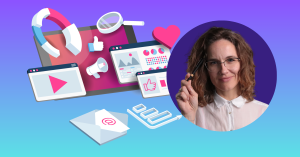Our first winner of the award for “Most Inspiring Women in AI in CEE” is a well-known face in the AI industry across the region. Raluca Apostol credentials speak for themselves – a PhD in machine learning, she brings her extensive expertise to the forefront, leading the research and product development efforts at Nestor.
For many years now, Apostol has also been spearheading efforts for the development of a cutting-edge smart cloud assistant, leveraging AI technology to drive behavioral change within organizations.
In an exclusive interview with The Recursive, Raluca opens up about the role of women in the AI industry, the immense potential of AI and machine learning, and her vision for the future.
The Recursive: Congratulations on winning The Recursive’s award for the most inspiring woman in AI! Can you share your thoughts on the role of women in the AI industry and the progress that has been made in recent years?
Raluca Apostol: First of all, please allow me to congratulate you and The Recursive on this initiative and assure you that this award is both a privilege and a big responsibility for me in portraying all the amazing women who are shaping the future of tech.
Regarding women’s role in this industry, it’s a well-known fact that women in AI and tech, in general, have historically been underrepresented, with men predominantly holding top positions in this field. However, various research studies, including Deloitte’s report “Women in AI” reveal that there has been progress in recent years towards increasing gender diversity and inclusivity. Still, in terms of percentage makeup, women’s representation is only around 26% of data and AI positions in the workforce.
Luckily, thanks to evidence that points out gender diversity (particularly among leadership positions) as a top driver for productivity and innovation, more and more companies and academic institutions have recently implemented diversity and inclusion initiatives to address the gender gap in AI. Also, according to Crunchbase data, funding to U.S.-based AI companies with at least one woman founder has steadily increased over the past few years, which is very encouraging news.
This shouldn’t come as a surprise, as in recent years, there have been some notable achievements by women in AI, leading prestigious AI research labs or institutes or making a difference from top positions in tech giants or as start-up founders. Three examples I would like to mention here: Daniela Rus – one of the world’s leading roboticists and head of MIT’s Computer Science and Artificial Intelligence Lab, Cassie Kozyrkov – Google’s lead data scientist and prominent advocate of safe, reliable AI and Anna Radulovski, founder at WomenTech Network.
What do you think can be done to encourage more women to pursue careers in AI, and what advice would you give to women who are just starting out in the field?
There are several steps that can be taken to encourage more women to pursue careers in AI. As I mentioned before, promoting diversity and inclusion is an important first step.
Companies should focus on creating cultures that value and respect people from diverse backgrounds, by adopting hiring practices that are gender-neutral and based on skills and by offering training and development opportunities to women in the field.
Mentorship programs can also help women at the beginning of their careers build relationships with experienced AI professionals who can offer advice and guidance, learn from other peers’ experiences, and gain valuable insights.
Also, initiatives like this award are very important as they increase the visibility of women in AI and promote their success stories. Highlighting these achievements can inspire and encourage other women to pursue careers in the field. Joining a community or participating in various networking events can also be a great help and provide valuable support, resources, and opportunities for growth.
Besides all these actions, I would add a last piece of advice for women: be consistent. The AI and tech industry can be challenging and competitive, but consistency is key. Be willing to take on difficult tasks, and keep pushing forward by being adaptive and willing to learn from failures.
Can you tell us about your background and how you became interested in machine learning?
I’ve always been fascinated by how the brain works and how it controls everything in the human body. During college, I wanted to pursue a career in medicine and become a neurologist, but I didn’t like chemistry at all. What I definitely knew at the time, was that I wanted to work on something that helps people. I didn’t know what that ‘something’ would look like.
At some point, I had my principal teacher tell me that I should study at the University of Computer Science and Applied Informatics, but it seemed scary at first – the exam was pretty hard to pass and there were just a few girls being accepted there at the time. But I loved physics, math, and informatics and said ok, I should try this. And I succeeded in getting in.
After the first 2 years of college, I discovered neural networks during a class. I was fascinated by how they work, how they are associated with the human brain, and how they can be trained. A black box that starts learning and once trained it could make predictions. That was the moment when I knew that AI is something I wanted to explore going forward – during my bachelor’s degree project, master’s thesis, and Ph.D. research work that over the years was referenced by Intel Corporation and LG Electronics in their patents. It was an intense experience – quite a learning journey, almost 24/7 work, and hundreds of experiments to do something better than other algorithms out there.
What inspired you to co-found Nestor, and how does your background in machine learning contribute to your role as Chief Product Officer?
Although I was very passionate about algorithms and machine learning, I still felt something was missing. I didn’t have that 150% fulfillment that I was looking for and didn’t feel that my work helped other people directly. So, I started my journey as an employee in the tech industry, switching a few companies and finding my path in Endava for a few years, where I learned a lot and developed so much (from a software engineer to a people manager and beyond).
For me, being a people manager was a responsibility that fed my heart and helped me discover that I love helping other people grow in their careers. And this was the moment when I realized that combining the two – my passion for helping people grow and my passion for AI – would be the dream. The answer was Nestor – the People Intelligence Platform that helps organizations engage, develop and retain people.
As a Chief Product Officer at Nestor, I now get to do what I like most every day, combining technology, AI, and working with people.
What are some of the key challenges organizations face in engaging, developing, and retaining talent, and how does Nestor’s platform address these challenges?
One of the key challenges organizations are facing today is to adapt and react quickly to the ever-changing business environment, and to incorporate new technologies such as AI into their daily practices to increase productivity, and innovation and to stay relevant. As a result, organizations need as well an adaptable and agile workforce that keeps track of all these changes.
Nestor’s platform helps companies exactly in this particular direction. Nestor connects performance management, employee engagement, and career development through a skills-based approach to help HR and business leaders make talent decisions aligned with the changing business needs.
Practices like internal mobility based on the smart matching of people’s skills and interests to development opportunities inside the organization, succession planning, and new intelligent workforce planning models all contribute to increased employee retention while allowing organizations to be more dynamic and cost-efficient.
Moreover, we all know that the need to build future-fit skills and navigate the current economic headwind is constantly increasing. Nestor platform pinpoints the existing skills gaps your workforce needs to overcome and unveils personalized opportunities for people to develop in the flow of work and perform better. Through predictive analytics and nudging automation, it empowers employees with custom recommendations so they can pursue dynamic career paths, access new growth opportunities and develop the skills that will help them succeed.
How do you see the field of AI evolving in the coming years, and how do you think Nestor can stay ahead of the curve?
The field of AI is likely to continue to evolve rapidly in the coming years, with new applications, technologies, and ethical considerations emerging. We can expect to see continued innovation and disruption related to new sophisticated AI-powered products and services and ChatGPT is just one example. The pace of change will be driven by advances in AI research and development, as well as by the demands and opportunities of different industries and sectors.
If we refer strictly to the HR-related field and particularly to our product (Nestor, ed.note), I think that in the near future, the focus will be to incorporate more data and applications of generative AI into the product. These integrations can have various applications such as AI-powered skills taxonomies, hyper-personalized opportunities for growth, or market insights.
This way organizations can identify easier and faster dynamic career paths and custom recommendations for guiding personalized career growth journeys whether it’s reskilling, upskilling, or non-linear opportunities. From HR and managers’ point of view, more algorithms and predictive analytics integrated into our product could lead to more refined and granular information to support strategic talent management processes and decisions with the help of our assistant at Nestor.
What do you believe are the most exciting opportunities for AI to have a positive impact on society in the coming years?
Developing and applying AI technology in responsible and ethical ways can surely have a positive impact on society in the coming years, from healthcare and education to climate change and transportation, helping create a more equitable, sustainable, and prosperous future for all.
When it comes to AI applicability in the human resources field, these technologies will have a significant impact on streamlining HR processes and improving overall organizational effectiveness.
Even as we speak, AI-powered tools contribute in various ways to analyze employee data and identify patterns that may indicate dissatisfaction or disengagement.
They can also help to personalize training and development programs for individual employees based on their strengths and weaknesses or automate performance evaluations, providing managers with data-driven insights into employee performance very fast.
However, it’s important to keep in mind that AI tools should be used to enhance the human experience and augment human decision-making, rather than replace it entirely.
Finally, can you share a personal goal you have for yourself or for Nestor in the next year or two?
Our plans for the future are towards including ChatGPT and other AI generative tools in our product. The goal is to enhance our users’ experience and simplify the decision-making process by providing insights into the auto-pilot mode to help organizations further optimize and transform their workforce.








